Composition
Sonata for flute, alto flute and organ, Jan Karman
Concert
Saturday, October 4, 2014 – 3:15 pm – Church of Bursins – première of Jan Karman’s sonata and projection of Marijke Gussenhoven’s paintings.
Carole Reuge, flûte • Florence Ursenbacher, flûte • Denis Fedorov, orgue • Marijke Gussenhoven, visual artist • Stephan Freivogel, video artist
Program
- Dimitri Shostakovitch – 5 pieces for 2 flûtes et orgue (transcription)
- Jan Karman – Elégie, flûte solo
- Elisabeth Jaquet de la Guerre – Sonate
- André Jolivet – Ascèse no 3
- Georg Philipp Telemann – Fantasia no 1 in A Major
- Jan Karman (1937) – Sonate pour flûte, flûte alto et orgue
- Caprice
- Pastorale
- Vivace
Jan Karman, composer
Born in 1937 in Colijnsplaat in The Netherlands, music came to Jan Karman very naturally: there was an abundance of music making and singing in his family. His older brother had been an organist in the local church, and as a matter of course he followed him as an organist, while not before his 17th he took formal lessons in playing the organ, the piano and theory of harmony under supervision of a very strict teacher, during several years.
Later studied and played the flute for many years, learning the old German and Italian masters, but also such composers as Janaćek, Hindemith, Genzmer. He performed in some local recitals playing the Bach-sonata’s and the early modern French composers as Koechlin, Ibert, Roussel and also at other occasions such as convents and meetings of different kind, in order to add lustre.
Always having done improvisation on his instruments he occasionally did some compositional work, but since five years seriously so, and on a continuous basis. Main influence came from the Flemish Renaissancists, Joh. Seb. Bach and his predecessors like Joh. Christoff Bach, and from several 20th century French composers, as well as the Belgian organist/composer Flor Peeters.
Current project: setting the Genevan Psalter in fugues, only suspended or interrupted by new ideas or by expanding previous ones to more substantial pieces. Two examples:
– Cantate Concertante for Solists, Choir, Brass-Sextet & Organ
– Pour Chasser le Diable – Drame Réligieux (on Psalm 11)
Standing on the shoulders of the masters and looking over the fence in the garden of the abundance of sounds, he watched how these sounds were organized into music.
Some of his works have been performed live, like the cantate “The Lord is my Shepherd”, for soprano, cello, choir and organ, by the Brugues Vocal Ensemble with solists and himself at the organ. The Belgian flautist Karla Lieve Savat performed his Élégie (flute solo).
In 2012, he gave an organ recital with pieces of Sweelinck, Bach, Franck, Flor Peeters and myself. Among the latter ones his Suite “Luctor et Emergo” and some fugues on themes from the Genevan Psalter.
He made a professional career in the field of actuarial science and information technology, while as a composer he is an autodidact.
Marijke Gussenhoven, painter
Born in Amsterdam, Marijke Gussenhoven lives and works since 2000 in Middelburg, The Netherlands.
With a graphic schooling at the Amsterdam Graphic College and specific courses, including screen printing at the Institute of Art Education, her main occupation became painting, sometimes alternating with three-dimensional work and photography.
In the late 70’s, she has organized many exhibitions for other artists in her gallery “the Cleene Catte”, in Middelburg. For about four years she has worked, painted and traveled in the U.S. and Canada, after which she has returned to Amsterdam, where she has worked for a design studio, a printing and a publishing firm.
She has made about 30 exhibits from 1995 to 2013 in Denmark, and The Netherlands, among others in Amsterdam, Almere, Lelystad, Veere and Middelburg (Art & Culture route, De Vleeshal, Gallery Orsmaal).
She paints mainly with acrylics, but she also uses other materials like oil paint, chalk or ink. The graphic element comes back in the rhythms and repetition of motifs. Drawing and painting have always been of great importance to her: “My life and art are inseparable.”
Among others, her sources of inspiration are the graphic landscapes of the Netherlands, like the fields, the different seashores and beaches.
The Saffron paintings:
These paintings are a combination or a reminiscence of washed ashore remnants of fishing nets, the precious fragrant saffron and youth drawings of figures. It then becomes an image, abstract, but with references to the beach, the sea, a new landscape.
The Figures:
For many years Marijke has painted from life models. The dancing figures shown during this concert were created in a very short time, during dancing sessions.
Marijke Gussenhoven is affiliated with the center of visual arts in Zeeland: www.cbkzeeland.nl.
Carole Reuge, flute
Carole Reuge is a concert flutist, playing in Switzerland, Europe and North America, playing all styles, from baroque to contemporary music. She plays an Abell wooden flute as well as a Brannen gold flute. To enhance the flute repertoire she collaborates with some composers by playing new music. Lately, she has played for the European and North American premières of “Ariake“, Jean-Christophe Rosaz’s piece for solo flute, evoquing the atmosphere of the moon shine, inspired by a japanese lamp, the “ariake“. She is also regularly invited as a jury member for competitions and exams.
After receiving her diploma in flute instruction (master of arts in music pedagogy) from the Lausanne Music Conservatory in 1998, Carole Reuge pursued and obtained her diplome de perfectionnement in 2000 and her virtuosity diploma in 2002 (master of arts in music performance) from La Chaux-De-Fonds Music Conservatory, in Switzerland, with Canadian flutist Michel Bellavance.
Carole Reuge also studied flute through master classes and exchanges between music schools in France, Italy and England (with José-Daniel Castellon, Andràs Adorjan, Riccardo Ghiani, Sophie Dardeau, Philipa Davies, etc…).
In 2006, she has created À Travers, the music studio she operates from her hometown in Gland, Switzerland. She teaches flute through private lessons, workshops and summer classes. With three teachers, enrollment at the studio totals about 50 students. À Travers flute students, have been recognized for their accomplishments, including prizes awarded from the Swiss Fondation for Youth Music Competition since 1998.
In addition to managing À Travers and teaching classes, Carole Reuge also regularly performs flute concerts, in Europe and America, including recitals, chamber music, and as a soloist with orchestra performances.
She is the artistic director and chairs the organization of La Côte Flûte Festival scheduled in Switzerland in october 2014 (www.flutefestival.ch).
Carole Reuge is one of the four founders of the association Pro Organo in Gland, Switzerland, who organizes seasonal concerts accompanying the beautiful organ at the protestant church of Gland.
Florence Ursenbacher, flute
Florence Ursenbacher has started her pre-professionnal flute studies at the Lausanne Music Conservatory with Brigitte Buxtorf. In 2000, she graduated with teaching diploma in La Chaux-de-Fonds Music Conservatory with swiss-canadian flutist Michel Bellavance.
During her studies, she has participated to diverse masterclasses and exchanges between schools, with: Aurèle Nicolet; Marie-André Benny, Montréal Conservatory, José-Daniel Castellon , Conservatoire de Musique de Région de Lyon; Philippa Davies, Guildhall School of Music of London; Sophie Dardeau, Conservatoire de Nancy.
She has also taken classes for chamber music and interpretation with Joje Pepi (argentinian composer and pianist), Marc Bourdeau (canadian pianist) and Catherine Courvoisier (pianist). After her diploma, she pursued her studies in «perfectionnement» for one year, also teaching music in the secondary school in Rolle (CH).
She teaches flute at the International School of Geneva since 2002, and is coordinator of the music school on the «Campus des Nation» since 2008.
She forms, with dear friend Carole Reuge, a duo since 2011.
Denis Fedorov, organ
Denis Fedorov was born in 1971 in Zirianka, Yakoutie (North-East of Siberia, Russia).
He entered a music school in 1980 where he learned the piano, the accordeon, music theory and composing. In 1985, he won the first prize of the young composer’s competition of the Yakoutie. From 1986 to 1990, he took accordeon classes (chromatical system, classical music style) and orchestra conducting in the class of V.F. Shashin in the Music Conservatory of Petropavlovsk-Kamtchatski (the Kamchatka peninusla, russia). He has won the “Grand Prize” on the accordeon competition in 1989 in Vladivostok, where he played by memory the integral of the first book of the Well Tempered Clavier in concert. In 1990, he won the second prize on the ex-URSS national accordeon competition, and received a special prize for the best Bach interpretation.
From 1990 to 1995, he studied in virtuosity class, classical music, with Vacheslav Semionov and harpsichord with I.M Ivanova at the National Academy of Music Gnessine of Moscou, where he obtained the soloist diploma in 1995.
In 1995, he started the organ at the Geneva Conservatory, with François Delor. At the same time, he took composition lessons with Jean Balissat and Rainer Boesch. Between 2001 and 2002, he pursued hes organ studies in the Vienna Conservatory with Thomas Schmoegner. He finished hes studies in the Music Conservatory of Lausanne, with Kei Koito. In 2004, he obtained the concert diploma, with appraisals of the jury. In 2007, the soloist diploma in the same school.
He gives concerts regularly on the organ, harpsichord, accordeon, as solosit, member of ensembles or orchestras, in Europe and Russia. He has participated to festivals such as: “Festival de Musique des Haudères” (Switzerland), Festival of Castiglione del Lago (Umbria, Italy), “Festival de musique de chambre du Pays de Gex & Académie” Raphaël Sommer (France).
Since twelwe years, he is titular organist of several churches around Lausanne, Switzerland. And since 2004, he is in the parish of Chailly-the Lausanne Cathedral.
From 2002, with some early music passionate instrumentists, he conducts the ensemble “Concordia Discors”, of whon he is the founder. The ensemble makes scientifical research on the baroque era, especially on JS Bach’s music. The particularity of this ensemble is the reconstruction of lost pieces of the Cantor from Leipzig. In their repertoire are Cantates, concerto for different solo instruments, trio sonatas from composers like Bach, Vivaldi, Telemann, Haendel, Purcell.
Between 1999 and 2002, he was teacher of piano and accordeao at the Alain Boullard music school in Morges. Since 2005, he teaches accordeao at the music school of Cossonay. Since 2007, he has his own keybord school in Lausanne.
Stephan Freivogel, artiste en video
Stephan Freivogel was born in 1986 in Nyon, Switzerland. Drawn towards classical music, he started the piano at 7 years old. in 2011, he finished his studies in plastic arts et the HEAD Geneva. His artistic work is centered on video and synthetic image. He continues his studies in philosophy at the university of Geneva.
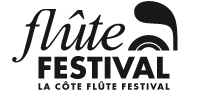
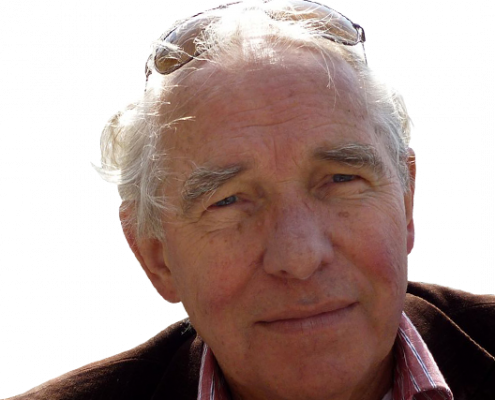
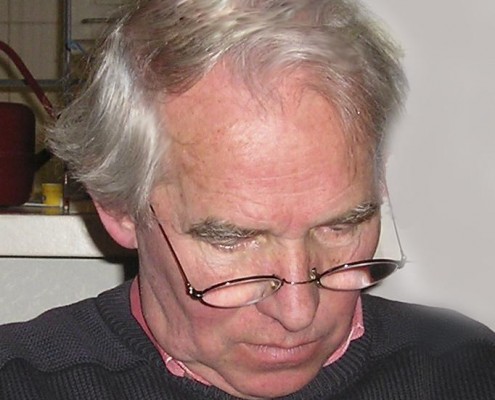
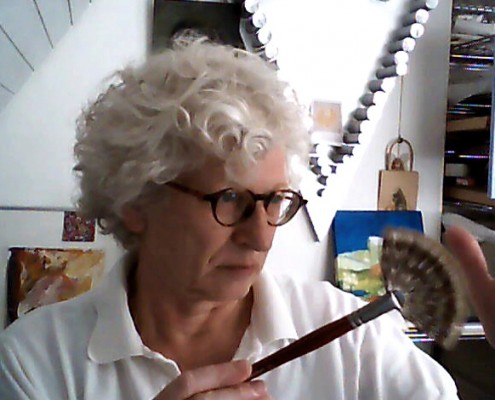
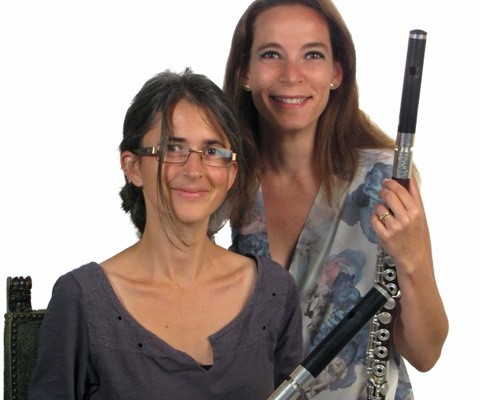
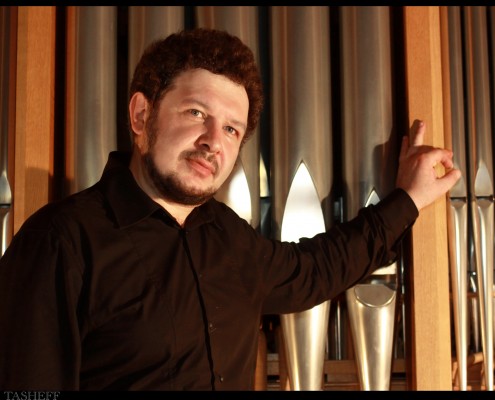


Follow Us!